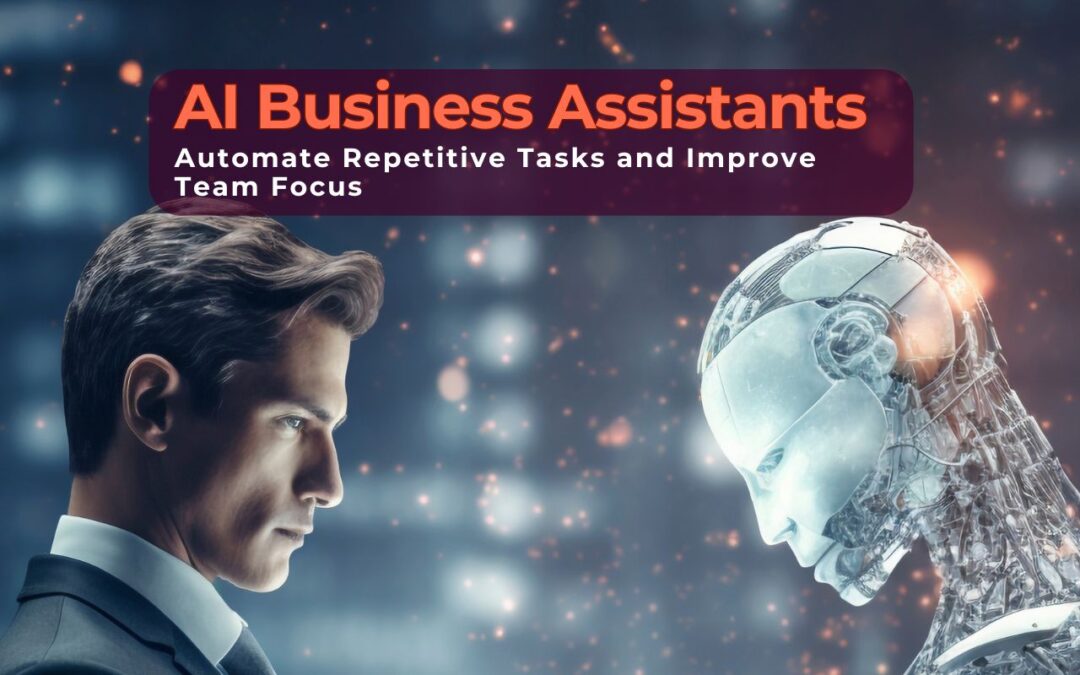In today’s fast-paced digital economy, time is one of the most valuable resources any business can possess. However, countless organizations find their employees bogged down by repetitive, low-value tasks that sap energy, creativity, and productivity. With mounting pressure to do more with less, businesses across industries are turning to artificial intelligence (AI) to gain an edge, especially in the form of AI business assistants.
These digital aides are redefining how work gets done by handling repetitive operations, enabling teams to focus on what matters most: strategy, innovation, and human-centric collaboration. From scheduling to customer interactions, report generation to data entry, AI business assistants are proving to be game-changers. But how exactly do they work, and what benefits do they bring beyond mere automation?
This article explores how AI business assistants are transforming the workplace, reducing operational burdens, and fostering deeper team focus and creativity, driving sustainable business performance.
The Rise of Repetitive Tasks in Modern Workplaces
Before diving into AI’s role, it’s important to understand the problem it’s solving. A significant portion of employees’ work time—especially in administrative, support, and service-based roles—is spent on repetitive tasks. These may include:
- Managing calendar appointments
- Answering frequently asked questions
- Entering data into spreadsheets or databases
- Tracking project statuses
- Creating regular reports
- Processing invoices and payments
- Managing internal emails and updates
These tasks, while essential for daily operations, often do not contribute directly to innovation or growth. Worse, they create mental fatigue and reduce the time available for strategic, impactful work.
As companies scale, the volume of such tasks increases, and human employees find it difficult to manage the load while staying focused on long-term goals. This is where AI business assistants step in.
What Are AI Business Assistants?
AI business assistants are software solutions powered by artificial intelligence designed to support administrative, operational, and communication functions within an organization. Unlike traditional automation tools, these assistants use natural language processing, machine learning, and contextual understanding to perform tasks, learn from patterns, and adapt to user preferences.
They act as virtual team members—handling mundane chores, offering intelligent suggestions, and even participating in decision-making processes through data-driven insights.
Automating Repetitive Tasks: The Core Benefit
One of the primary uses of AI business assistants is automating time-consuming, repetitive tasks that previously required human involvement. This includes:
1. Email and Calendar Management
AI assistants can prioritize incoming emails, draft responses, schedule meetings, send reminders, and coordinate between teams without manual input. They can interpret natural language commands like “schedule a team meeting next week” or “reschedule my 3 PM call to tomorrow” with accuracy and speed.
2. Data Entry and Management
Manual data entry is not only tedious but also prone to human error. AI can extract data from emails, forms, or documents and input it into the appropriate systems accurately. Over time, it learns to recognize patterns and reduce the need for supervision.
3. Generating Reports and Dashboards
Rather than spending hours compiling data into reports, AI can collect real-time information, analyze it, and generate custom reports. These reports can be scheduled or triggered by certain business events, giving teams instant access to critical metrics.
4. Customer Support Automation
AI assistants can handle initial customer interactions, answer FAQs, route queries to the appropriate department, and even process basic service requests—freeing human support agents to focus on complex or sensitive issues.
5. Project Coordination
From assigning tasks and tracking progress to reminding team members of upcoming deadlines, AI can act as a reliable project coordinator. It can send nudges when timelines slip and help ensure projects stay on track.
Shifting Team Focus to Strategic Work
By offloading repetitive and low-value tasks to AI assistants, businesses can realign their workforce to focus on areas where human skills truly shine. Here’s how AI enhances team focus and engagement:
1. Enabling Creative and Strategic Thinking
When employees no longer have to deal with routine chores, they can dedicate more time to innovation, brainstorming, and problem-solving. This shift improves job satisfaction and encourages a culture of forward-thinking.
2. Improved Collaboration
AI business assistants can help streamline communication across departments, ensuring that the right people receive the right information at the right time. This improves decision-making and reduces time wasted in unnecessary meetings or email threads.
3. Supporting Learning and Development
Employees freed from monotonous tasks can pursue learning opportunities, whether it’s mastering a new skill, diving into market research, or staying updated on industry trends. This continual learning leads to a more resilient, future-ready workforce.
4. Reducing Burnout
Workplace burnout often stems from the mental toll of repetitive work combined with pressure to innovate. By relieving employees of mundane tasks, AI creates a more balanced and fulfilling work environment.
Organizational Benefits of AI Business Assistants
The adoption of AI business assistants goes beyond productivity. Businesses also gain in other key areas:
1. Cost Efficiency
By automating low-skill tasks, companies reduce the need to hire additional administrative support. The cost of an AI assistant is significantly lower than maintaining an expanded human workforce for routine tasks.
2. Scalability
As a business grows, so do its operational needs. AI solutions scale easily, handling more tasks without needing additional infrastructure or oversight.
3. Consistency and Accuracy
Unlike humans, AI does not suffer from fatigue, distraction, or forgetfulness. Tasks are executed consistently, accurately, and within predefined parameters, minimizing the risk of errors.
4. Better Time Management
With AI assistants handling scheduling and time tracking, employees can better manage their workload and avoid overlaps, missed appointments, or inefficient task switching.
Overcoming Challenges of AI Adoption
While the advantages of AI business assistants are clear, businesses may still face challenges when adopting them:
1. Change Resistance
Employees may fear that AI will replace their jobs or disrupt their workflow. Proper training, communication, and involvement in the adoption process can ease concerns and highlight the technology’s role as a support tool, not a replacement.
2. Integration with Existing Systems
Implementing AI assistants requires seamless integration with a company’s existing digital ecosystem. Planning ahead, choosing compatible systems, and allocating technical resources are essential for success.
3. Data Privacy and Ethics
AI systems rely on data to function effectively. Ensuring that privacy regulations are followed and sensitive information is protected is vital. Businesses must adopt ethical AI practices and be transparent with employees and customers about how data is used.
4. Maintaining the Human Touch
Automation can sometimes make interactions feel impersonal. It’s important to strike a balance—using AI to handle routine interactions while leaving room for human engagement in critical or emotional contexts.
Best Practices for Maximizing Impact
To get the most out of AI business assistants, companies should:
- Start small: Begin with automating a few select tasks and scale gradually.
- Involve teams: Encourage employee feedback and provide training to make the transition smooth.
- Continuously evaluate: Monitor the impact of AI assistants and make adjustments as needed.
- Focus on value: Align AI adoption with core business objectives, such as improving customer experience or boosting employee productivity.
- Combine AI with human oversight: Keep humans in the loop to ensure the technology supports—not hinders—workflow quality.
Realigning the Role of Humans in the Workplace
AI business assistants aren’t about replacing humans—they’re about enhancing what humans do best. By managing operational burdens, these tools allow people to pursue higher-level responsibilities, tap into their creativity, and drive meaningful business outcomes.
Employees who once spent hours sorting emails or compiling spreadsheets now have time to design campaigns, build customer relationships, or improve product strategies. The shift toward strategic and creative work fosters personal growth and stronger organizational performance.
Conclusion: A Future Focused on What Matters
The future of work lies not in doing more, but in doing what truly matters. AI business assistants help organizations achieve this by automating repetitive tasks and giving employees the space to focus on value-driven work.
This shift doesn’t just enhance productivity—it creates a culture of innovation, empowers teams to thrive, and strengthens a company’s competitive edge in the market.
By investing in AI strategically and ethically, businesses position themselves not only to survive the evolving digital landscape but to lead it.
FAQs
Q: Can AI business assistants be customized for specific industries?
Yes, AI business assistants can be trained to understand industry-specific terms, workflows, and compliance needs. Whether it’s finance, healthcare, retail, or logistics, AI can be tailored to meet unique operational demands.
Q: Will AI assistants replace human jobs?
Rather than replacing jobs, AI assistants are designed to enhance roles by automating tedious tasks. This allows employees to focus on strategic, interpersonal, and creative responsibilities that require human insight.
Q: How secure are AI business assistants?
Security depends on how they are implemented. Businesses must ensure that AI tools follow best practices for data encryption, access control, and compliance with privacy laws to maintain confidentiality and trust.
Q: Do AI business assistants require technical knowledge to use?
Most modern AI assistants are built with user-friendly interfaces and natural language capabilities. Minimal training is required, and many are intuitive enough for employees to interact with them using everyday language.
Q: How can a company measure the ROI of AI business assistants?
ROI can be measured through reduced time on administrative tasks, improved employee satisfaction, faster turnaround times, and higher-quality output in strategic projects. Metrics such as productivity gains and operational savings help quantify impact.













